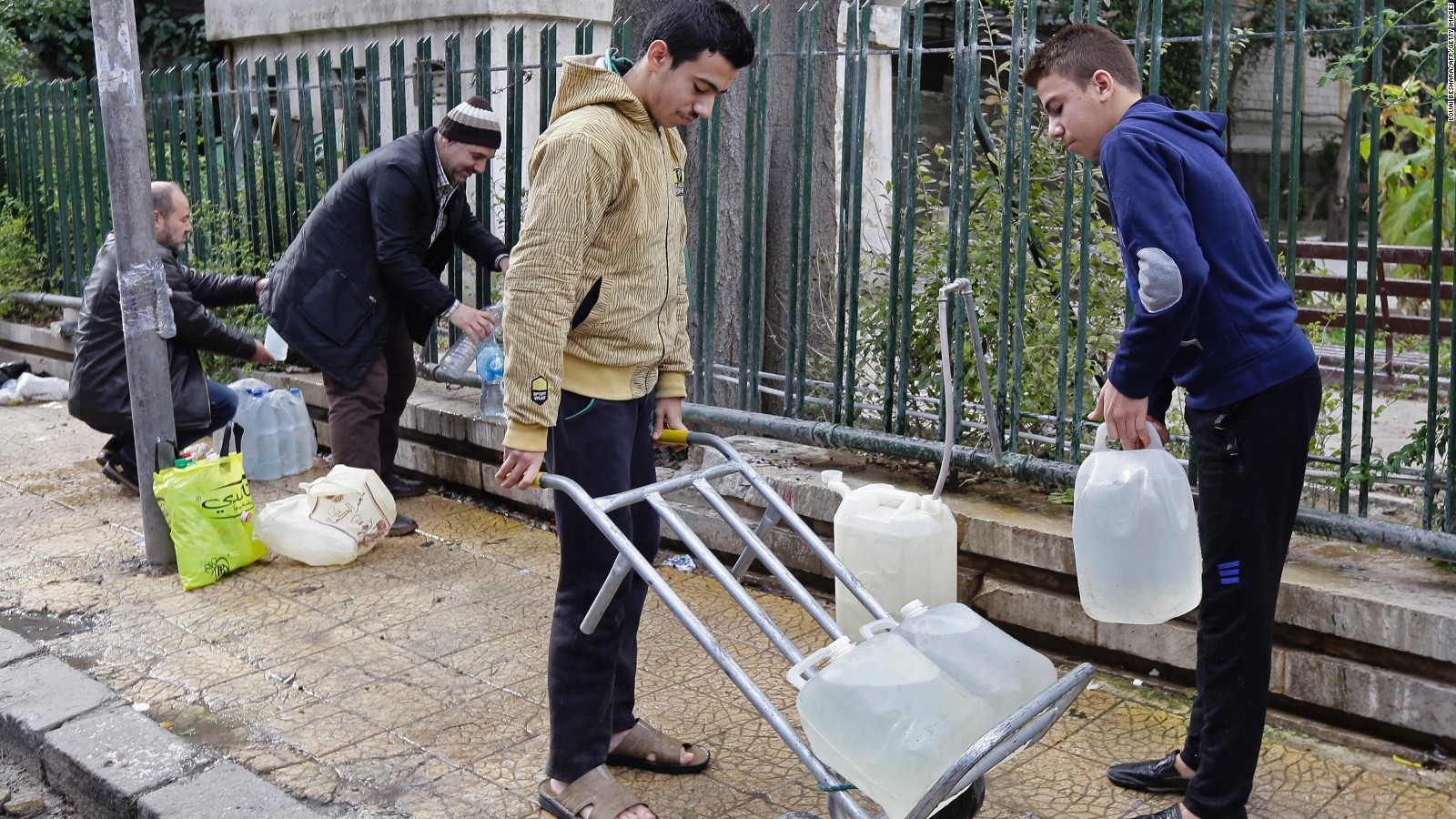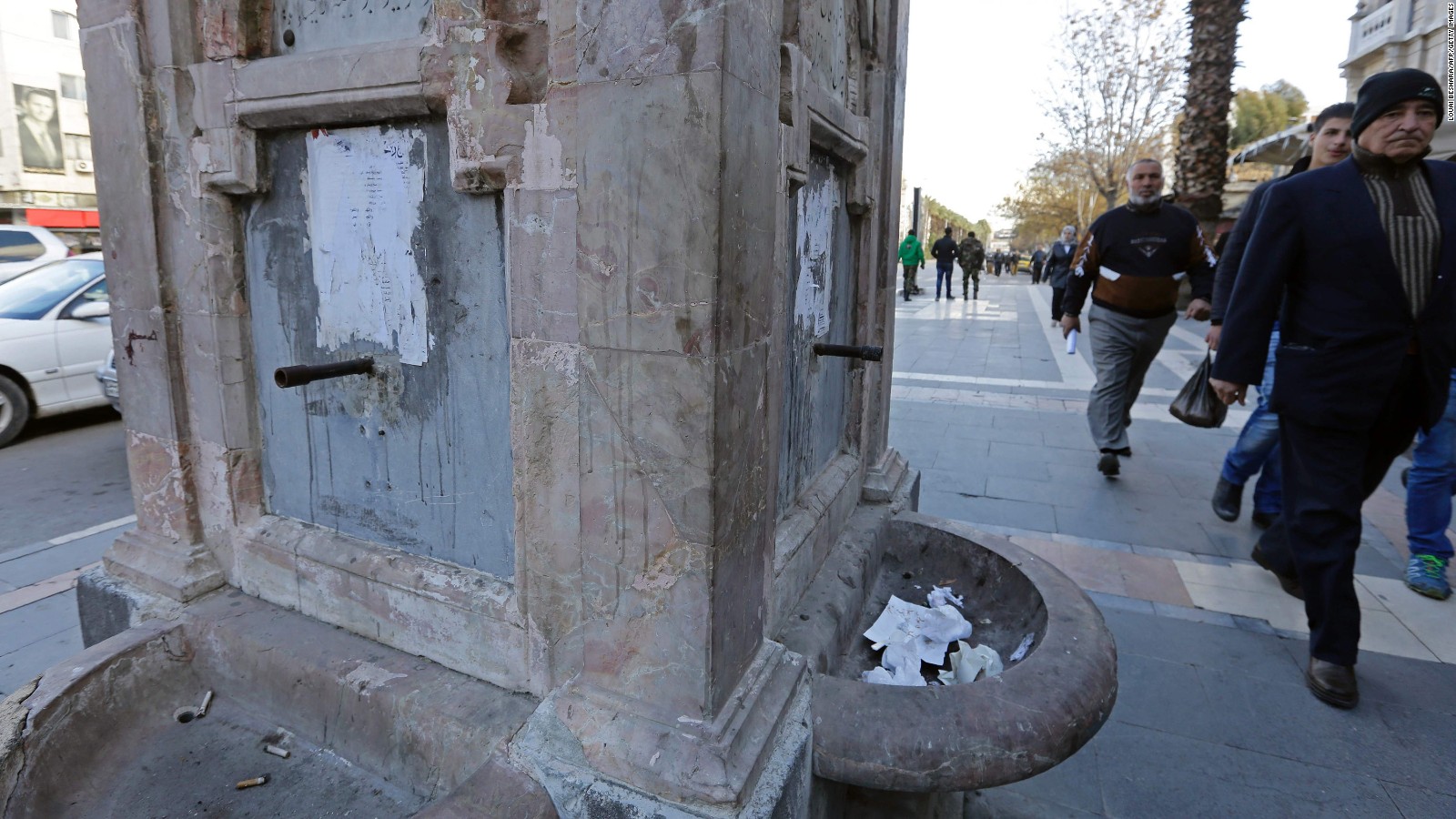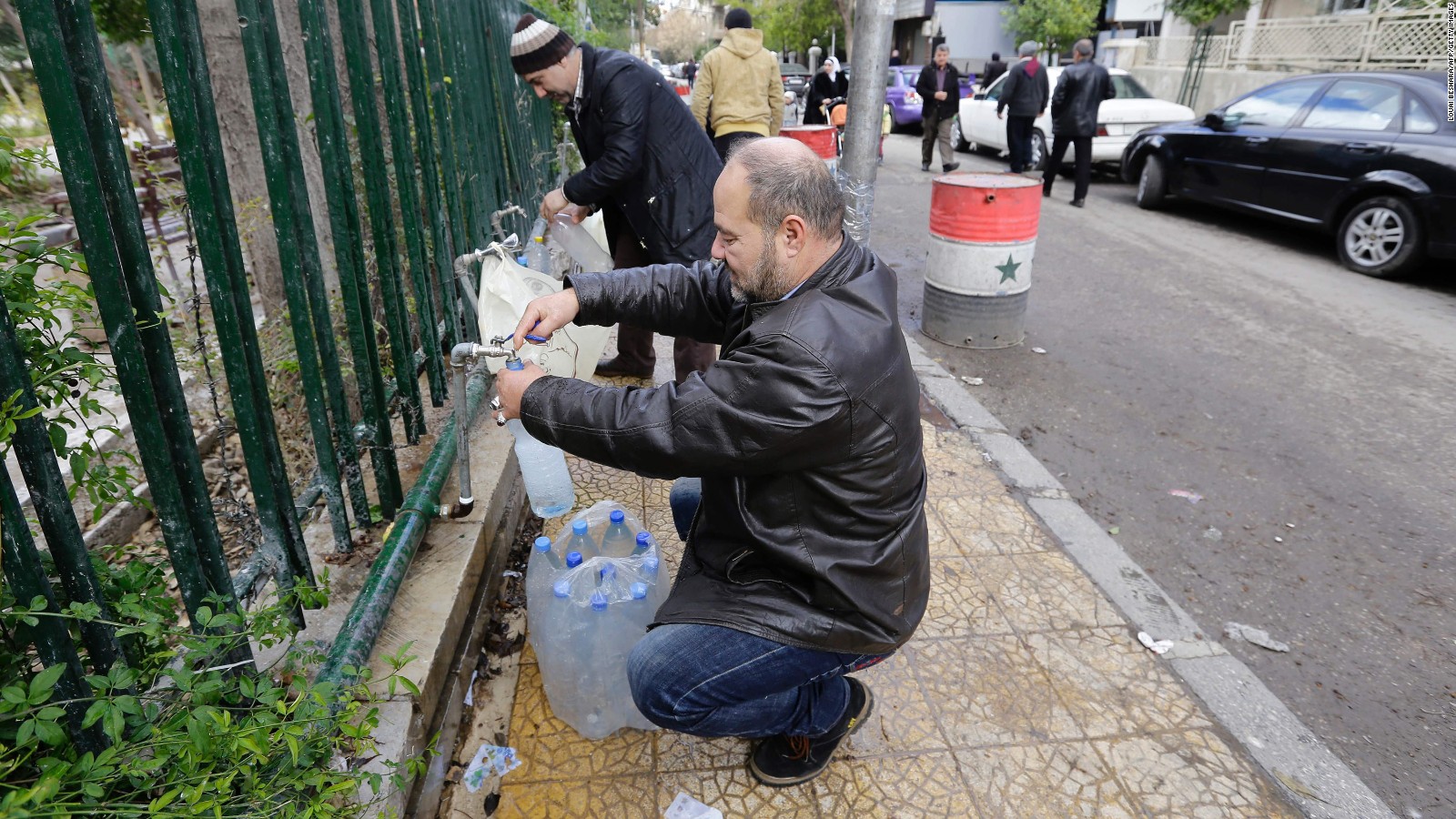http://www.cnn.com/2017/01/03/middleeast/syria-damascus-water-crisis/



By Eliza Mackintosh
Updated 6:21 PM ET, Tue January 3, 2017
Story highlights
- UN says water supply cut to 4 million people in Damascus
- Residents in the Syrian capital fear water contamination
(CNN)Nour, a housewife in Damascus, says the latest joke in the Syrian capital is also a prayer of sorts: "May the gold you hold become water."
It is a half-hearted attempt to make light of a water crisis that is impacting millions in Damascus, a city that has been relatively sheltered from the violence raging elsewhere in the country.
Nour said that her family just got water on Tuesday morning, after four days without access. Her family quickly lined up to use the shower and she switched on the washing machine. Now, when she hears the sound of the water motor running, she says it is "like a wedding."
"When the water comes, it's the same joy as a mom having a boy after 10 daughters," Nour said. She did not feel comfortable sharing her last name with CNN.
Some four million people in Damascus have suffered from acute water shortages for more than a week after springs outside the Syrian capital were targeted, the UN's Office for the Coordination of Humanitarian Affairs (OCHA) said in a statement on December 29.
Water from the Wadi Barada and Ain al-Fija springs, which serve 70 percent of the population in and around Damascus, was cut after infrastructure was damaged in fierce clashes. OCHA described the damages as "deliberate," without saying who was responsible.
Syrian government and opposition trade blame
The Syrian government and rebel forces are trading blame for the water shortages.
Rebels claim the government destroyed the water pumping station in the Wadi Barada valley, one of the last remaining rebel-held pockets of Damascus.
The Syrian army and its allies are pushing to recapture Wadi Barada in spite of a nationwide ceasefire. The regime claims it is going after rebel groups who were excluded from the truce, like former al Qaeda affiliate Fateh al-Sham, which it says is operating in the area (although local groups deny this).

Syrians fill plastic containers with water at a public fountain by a park in Damascus.
The Syrian regime has accused rebels of contaminating the springs with diesel, forcing the Damascus water authority to cut the supplies.
CNN could not independently verify these claims.
A group of pro-opposition groups and civil society organizations in Wadi Barada, including the Local Council and the Syrian Civil Defense, released a statement on Monday calling for the International Committee of the Red Cross and the United Nations to assess damages at the Ain al-Fija spring, situated northwest of the capital in a mountainous area near the border with Lebanon.
"(We express) our willingness and readiness to accompany and assist teams heading to al-Fija spring to accelerate resupplying fresh water to our people in Damascus city," the statement read. "This facilitation needs to be accompanied with activating the ceasefire in Wadi Barada region and halting the aggression conducted by the Syrian government forces backed by Hezbollah militias."
The Syrian government denies any involvement in the destruction of the springs. State-run Syrian Arab News Agency (SANA) reported on December 27 that the springs in Wadi Barada "came out of service as a result of terrorist acts."
Fears over water contamination

Residents walk past a drinking fountain that has run dry.
In recent days, the Syrian government initiated a program of rationing and distribution to address the scarcity of water, as seen in footage released by SANA on December 30. But OCHA says the efforts aren't enough to meet the massive need.
"[People] are having to purchase water from private vendors, where prices and water quality are unregulated," OCHA said in a statement. "The UN is concerned about the lack of water which could lead to waterborne diseases, particularly among children, as well as the financial strain this is having on families."
Ghassan, a medic in Damascus city center who did not feel comfortable sharing his last name with CNN, said many people are worried that the drinking water being distributed might be contaminated. He added that residents are more concerned with finding potable water than going to the doctor.
Thomas Webber, an American resident of Damascus, told CNN that he has not had fresh water since December 28. Webber, who lives in the Al Rhoumani district, said that his two full tanks ran dry after just two days. Since then, he and his wife have been relying on a stock of bottled water for cooking and drinking. Water they fill up at a government-installed pipe near their home is used for washing and flushing the toilet.
Webber's district and the neighboring Malki district have not yet been slated to receive any deliveries, according to a government website announcing scheduled water truck stops.
"Two days ago they [the government] shared online which districts would get water, but people in districts on the list say there was no water deliveries," Webber told CNN in a phone interview.
TV advertisements are also being used to notify residents of scheduled deliveries. Webber's mother-in-law, who lives in a district near Shalan, was one of the lucky ones. She recently received a delivery from a government water truck, which filled up tanks in her home.
As water runs low, locals get creative

Damascus residents fill plastic containers with water at a public fountain.
Webber said nearby shops are running out of bottled water and that some locals are getting water from a government-installed plastic pipe in Jawez park.
"For some reason parks are still getting water. On the 29th I found hoses going from fountains, draining fountains in the parks," Webber said. He believes that the parks are getting water from artesian wells.
He has concerns about the quality of water coming from the Jawez pipe. Ever since his wife fell ill, they have only been using it for sanitation purposes.
Webber says people are getting creative in the crisis. His local car-washer has now become the neighborhood's go-to person for water delivery.
''He started out carrying 20 liter jerry cans to and from the pipe for us and other people. Then I saw he got a pushcart. Now he has borrowed a small 4x4 jeep from a friend and he's using that. He's making more money delivering water than he ever was washing cars.''
Webber says he's trying to stay optimistic, despite the ongoing water crisis: ''The glass is still half-full, but it's emptying fast.''
Basma Atassi and Ruth Hetherington in Abu Dhabi contributed to this report.




No comments:
Post a Comment